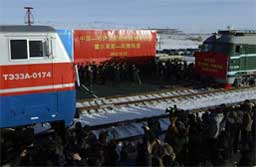KORGAS (Xinhua) – A second cross-border railway to Kazakhstan opened Saturday linking China’s northwest Xinjiang Uygur Autonomous Region and the central Asian country. The rail line started service with a freight train, which travelled from China’s east Jiangsu Province’s port city Lianyungang, passing through the Xinjiang-Kazakhstan border city of Korgas and entered Kazakhstan’s railway.

- Ceremony Xinjiang Uyghur region to mark the opening of the new cross-border railway between China and Kazakhstan.
(Photo: Xinhua)
The total trade volume between China and central, west, and south Asian countries increased from $25.4 bln to more than $370 bln, up about 30% annually. In particular, trade between Xinjiang and five central Asian countries reached a historical high of $16.98 bln last year, according to customs figures. Favourable policies include tax reimbursement for exports and permission to carry duty-free products. Citizens from China, Kazakhstan and a third country will be permitted to stay at the centre for as long as 30 days.
Since 2010, China has been redoubling efforts to build Xinjiang into a regional economic centre, eyeing its geographical closeness to central Asia and the region’s abundant natural resources including oil, coal and natural gas. The Korgas Pass in particular, is only 200 km away from Kazakh capital Astana, and 670 km from Urumqi, the provincial capital of Xinjiang province in China. Last year, a China-Kazakhstan free trade centre, first of its kind in Eurasia, was launched at Korgas.
The rail line comprises of 292 km section in China and 293 km section in Kazakhstan. They join at the Korgas Pass in Xinjiang Uygur autonomous region. According to railway officials, construction of the Chinese side of the railway cost $962 mln.
The railway, connecting the two countries at Korgas, will as well help the city become an international transportation hub with a network of highways, railways and pipelines, which in turn will make Xinjiang more open to the west. It is expected to ease the burden of the Alataw trade pass, where the first China-Central Asia railway traverses. It handles 15.6 mln tonnes of train-laden cargo a year.
Industry observers expect the Korgas pass, which now connects China and Kazakhstan by a railway, a highway, and an oil pipeline, to handle 20 mln tonnes of cargo a year by 2020 and 35 mln tonnes a year by 2030, state-run Xinhua news agency reported.
Under an agreement signed between China and Kazakhstan in September 2004, the Korgos (also spelled Horgos) centre will be developed into a “free port” with free trade and investment opportunities. The centre will also serve functions related to processing, manufacturing, trade, merchandise procurement, financial services, tourism and entertainment.

